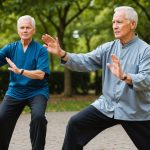As you grow older, maintaining an active lifestyle becomes more important than ever. In the twilight years, not only does physical activity help maintain strength and flexibility, it also provides significant benefits to cognitive health. This article will explore the correlation between high-intensity exercise and the potential reduction of dementia risk in adults over 65. We delve into the findings of various studies, including those accessible on Google Scholar and PubMed Central (PMC), analyzing the role of aerobic exercise in mitigating the risk of diseases like Alzheimer’s and other forms of dementia.
The Link between Exercise and Cognitive Health
The relationship between exercise and cognitive health has been a subject of numerous scientific studies. When you engage in physical activity, your brain undergoes a myriad of positive changes which may help maintain mental fitness. Regular exercise increases the number of tiny blood vessels that bring oxygen-rich blood to the region of the brain that is responsible for thought. Moreover, it also stimulates the development of new nerve cells and increases the connections between brain cells (synapses). This results in brains that are efficient, plastic, and adaptive, which translates into better performance in complex mental activities.
In the same genre : What Strategies Help in Reducing Medication Errors in Hospital Settings?
According to meta-analyses available on Google Scholar and PMC, regular physical activity, especially of high intensity, has shown a consistent association with delayed or slower cognitive decline in older adults. In a study published in the Journal of Alzheimer’s Disease, older adults who exercised regularly showed significant improvements in cognitive function and brain health.
High-Intensity Exercise and its Impact on Dementia Risk
Studies suggest that high-intensity exercise might be particularly beneficial for older adults when it comes to reducing the risk of dementia. A study published in the Archives of Neurology found that high-intensity exercise, such as running or aerobic dancing, led to a 40% lower risk of developing dementia compared to low-intensity activities like walking.
Also to see : The best snus for travel : discreet options for on-the-go
The aerobic nature of these exercises increases the heart rate, pumping more oxygen to the brain, and triggering multiple physiological changes that promote brain health. High-intensity exercise also releases a flood of endorphins—natural mood lifters—that can keep depression and anxiety at bay.
Dementia and Alzheimer’s: Prevention through Physical Activity
Alzheimer’s disease is the most common form of dementia, a general term for memory loss and other cognitive abilities serious enough to interfere with daily life. Alzheimer’s disease accounts for 60-80% of dementia cases. Keeping physically active or becoming more active during middle and later life can reduce your risk of Alzheimer’s and dementia.
Scientists suggest that physical exercise may directly benefit brain cells by increasing blood and oxygen flow, which can also reduce brain inflammation and promote neural health. Moreover, research has shown that high-intensity aerobic activity can improve cognitive function and decrease the risk of cognitive decline.
Ensuring a Healthy Future: Practical Tips for Older Adults
While the thought of high-intensity exercise may be daunting, it is important to remember that ‘high intensity’ is relative to your personal fitness level. For an older adult who has been sedentary, a brisk walk could be considered high intensity.
One of the most important things is to find an exercise routine that you enjoy and that fits into your lifestyle. This could be gardening, dancing, swimming, or even playing catch with the grandchildren. The key is to stay active and keep moving.
Starting slow and gradually increasing the time and intensity of your workouts can also help prevent injuries. And remember, it’s never too late to start. Even if you haven’t been active previously, taking up exercise in your 60s, 70s, or even 80s can provide great health benefits.
In conclusion, while further research is needed to fully understand the link between high-intensity exercise and dementia risk, current studies suggest a promising correlation. Regular physical activity, particularly if it’s high-intensity, seems to protect against cognitive decline with age and may reduce the risk of dementia and Alzheimer’s disease.
The Role of Aerobic Exercise in Mitigating Vascular Dementia
Vascular dementia is the second most common type of dementia after Alzheimer’s disease. It occurs when vessels that supply blood to the brain are damaged, leading to a reduction in crucial nutrients and oxygen, which in turn impairs cognitive functions. With the understanding that physical activity enhances blood flow, it becomes vital to investigate its potential in mitigating the risk of vascular dementia.
A randomized controlled study availed on PMC shows that aerobic exercise indeed improves cerebral blood flow. Specifically, high-intensity exercise has been found to be more effective in this regard. By enhancing blood flow, the brain is sufficiently supplied with essential nutrients and oxygen, thus reducing the likelihood of cognitive impairment associated with vascular dementia.
A systematic review on Google Scholar supports these findings. The review, which analyzed the impact of physical activity on adults over 65, found that consistent engagement in high-intensity exercise led to increased cerebral blood flow, better cognitive function, and a reduced risk of vascular dementia.
Aerobic exercises such as swimming, cycling, and running are highly recommended. These types of exercise not only improve cardiovascular health but also enhance cognitive abilities thanks to the increased flow of oxygen-rich blood to the brain.
The Importance of Regular Exercise in Preventing Cognitive Decline
In a world where the number of older adults is continually growing, maintaining cognitive health in later life stages is an issue of increasing importance. A meta-analysis available on PubMed and Google Scholar revealed that regular exercise reduces the risk of cognitive decline and dementia in older adults.
Physical exercise, particularly high-intensity aerobic activity, has been associated with numerous benefits to brain health. It promotes the development of new brain cells, enhances synaptic plasticity, and improves overall cognitive function.
Moreover, according to multiple free articles on PMC, consistent engagement in physical activity can lead to significant improvements in various cognitive domains, such as attention, memory, and executive function, which are often affected in dementia.
In addition, a systematic review of randomized controlled trials showed that regular exercise plays a crucial role in preventing cognitive decline and diseases such as Alzheimer’s and vascular dementia. The review concluded that both aerobic and resistance exercises are beneficial for cognitive health in older adults.
Conclusion
Physical activity, particularly high-intensity aerobic exercise, appears to offer significant benefits to older adults in maintaining cognitive health and reducing the risk of dementia. Studies available on platforms such as Google Scholar, PubMed, and PMC consistently show a positive relationship between regular exercise and cognitive function.
High-intensity exercise, by improving cardiovascular health, enhancing cerebral blood flow, and promoting the growth of new brain cells, seems to be particularly effective. It can help in staving off diseases like Alzheimer’s and vascular dementia, which represent a considerable percentage of dementia cases.
However, it is crucial to note that ‘high intensity’ is relative to individual fitness levels. Therefore, older adults are encouraged to find physical activities that they enjoy and can consistently engage in, to reap the cognitive benefits of regular exercise.
While more research is needed to cement these findings, the current evidence presents a compelling case for promoting regular, high-intensity physical activity among older adults as a measure against cognitive decline and dementia. The mantra, therefore, remains, ‘keep active for a healthy, future cognitive health.’











